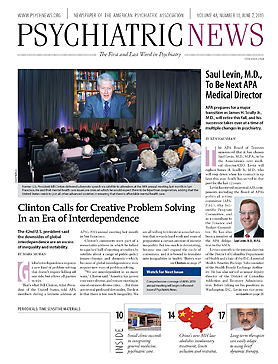Researchers may have found a neural marker to identify alcohol-dependent patients who are at risk for relapse. Their findings, published online in JAMA Psychiatry May 1, indicate that disrupted activation of the ventromedial prefrontal cortex and the anterior cingulate cortex areas of the brain plays a role in jeopardizing recovery from alcoholism.
Lead author Dongju Seo, Ph.D., an associate research scientist in psychiatry at Yale School of Medicine, and colleagues evaluated 45 recovering alcohol-dependent patients aged 18 to 50 (10 of whom were women) who had abstained from alcohol for four to eight weeks while they resided in an inpatient treatment research facility and were actively engaged in substance abuse treatment.
Functional magnetic resonance imaging (fMRI) of the participants’ brains was conducted as they engaged in brief individualized script-driven imagery trials of stress, alcohol cues, and neutral-relaxing scenarios.
After discharge from inpatient treatment, all patients were followed up with face-to-face interviews conducted at days 14, 30, and 90 postdischarge to evaluate relapse outcomes using urine and breathalyzer samples and the Form 90 substance use calendar. Thirty healthy, demographically matched control subjects were also evaluated in the same manner.
Relapse rates were discouraging, but also predictable, based on the brain patterns seen on fMRI. Among the alcohol-dependent patients in the study, 13 had relapsed by two weeks after leaving treatment, 20 had relapsed by the end of one month, and 31 had returned to drinking by the final three-month follow-up.
The patients who eventually relapsed showed increased activation of the brain’s ventromedial prefrontal cortex and anterior cingulate cortex, and the level of activity consistently predicted alcohol craving, time to relapse, and relapse severity.
That may mean that fMRI results could be used an indicator of a patient’s likelihood of experiencing successful treatment for alcohol dependency. “The patterns of brain activity we observed may one day serve as a neural marker that could help clinicians identify alcohol-dependent patients in recovery who are most at risk of relapse,” said Rajita Sinha, Ph.D., the study’s senior author and a Foundations Fund Professor of Psychiatry and a professor in the Child Study Center and of Neurobiology at Yale University, in a press release announcing the study’s publication.
National Institute on Drug Abuse (NIDA) Director Nora Volkow, M.D., and Ruben Baler, Ph.D., NIDA’s health science administrator, discussed the significance of the study’s findings in an accompanying editorial, saying they represent an important step forward in the treatment of alcohol dependency because they “manage to map the relationship between relapse risk and specific neural substrates, advancing the feasibility of a brain biomarker for predicting relapse into alcohol drinking.”
Volkow and Baler noted that this work, along with other recent research, brings the imaging field “tantalizingly close to developing a reliable and practical approach” for such predictions, an impressive move toward more individualized medicine and optimal patient care.
Sinha hopes for even more. “Our findings may also have implications for the use of medication and behavioral treatments that restore prefrontal function, as they could potentially benefit people at high risk of relapse.”
The research was funded by the National Institute on Alcohol Abuse and Alcoholism. ■

